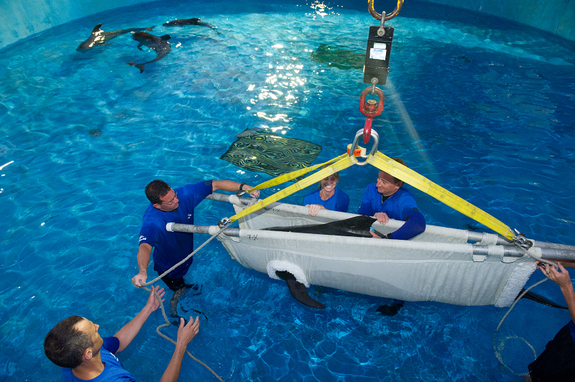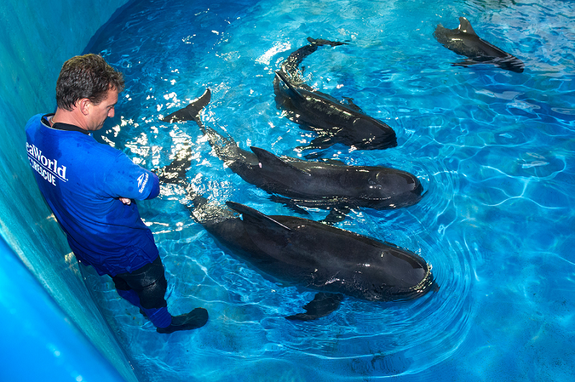Four Baby Whales Rescued in Florida

Four rescued
baby pilot whales have been taken to SeaWorld Orlando after washing up on a Florida
beach. The whales, one male and three females, are the only survivors of a mass
stranding that left 18 other whales dead.
On Saturday
(Sept. 1), a pod of 22 short-finned pilot whales turned up at Avalon
State Park Beach near St. Lucie on Florida's east coast. Volunteers and environmental
officials responded to the scene to try to keep the whales — the largest of
which was more than 25 feet (7.6 meters) long — hydrated and shaded.
But 17 died or
had to be euthanized. The remaining five, all young whales, were brought to a rehab center at Florida
Atlantic University's (FAU) Harbor Branch Oceanographic Institute. There, they
were treated for malnutrition, dehydration, stress and infection, FAU officials
said.
One of the
whales died Monday around noon after a rapid decline in health, according to
FAU; a necropsy, or animal autopsy, was performed Tuesday. The other four were
taken to SeaWorld Orlando early Wednesday and placed in a quarantine area,
where they will be cared for and tube-fed, a statement from the marine park
explained. The caretakers hope to return the whales to the wild eventually, but
a statement from FAU said the outlook for their survival "remains
guarded."

Authorities are
investigating the cause of the stranding and expect to get the dead whales'
autopsy results in the next several weeks. Some officials speculate that one of
the dominant adult whales became ill, stranded itself and the rest of the pod
followed. Pilot whales live in pods of between 15 to 50 individuals and they
tend to stick together — and that means even when one of the whales becomes ill
or injured.
For instance,
in May 2011, more than 16 pilot whales stranded in the lower
Florida Keys. "They tend to strand in pods, they stick together, if one is
sick, the whole pod is going to strand," Anne Biddle, media relations
director for the Marine Mammal Institute, told LiveScience at the time. And in
2003, some 25 pilot whales were stranded in the Keys.
Scientists say
many factors could cause a mass stranding of whales, including disease, loud
noises (from oil and gas exploration, Navy sonar, and even natural events like
earthquakes), toxins or simple confusion.
Follow
LiveScience on Twitter @livescience.
We're also on Facebook & Google+.
Copyright 2012 LiveScience,
a TechMediaNetwork company. All rights reserved. This material may not be
published, broadcast, rewritten or redistributed.
No comments:
Post a Comment